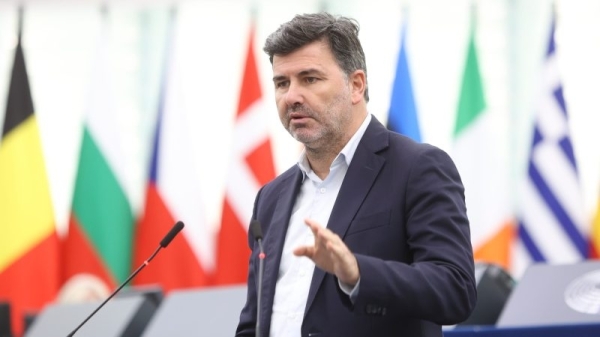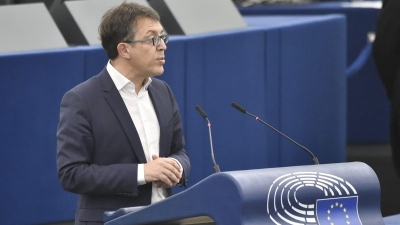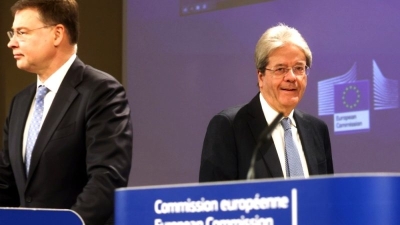Key lawmaker wants revenue cap reinstated in EU power market reform

The European Parliament’s lead negotiator on the EU’s power market reform has sparked concern by proposing the return of a controversial revenue cap for power generators with cheap production costs, like renewables and nuclear.
The European Union adopted a temporary revenue cap for so-called “inframarginal generators” last year to provide money for EU member states to protect consumers from soaring energy bills.
According to Spanish lawmaker Nicolás González Casares, a similar measure is needed for emergency situations to ensure EU governments have the financial firepower to protect consumers from price shocks. Casares is the European Parliament’s speaker on the EU’s proposed power market reform.
“If only some member states with sufficient resources can protect customers, this would lead to severe distortions in the internal market,” says an amendment tabled by the Spanish MEP, who hails from the Socialists and Democrats (S&D) group in Parliament.
“A commitment to a joint Union-wide cap on market revenues from inframarginal generators should enable avoidance of such distortions. An obligation to pass on the surplus revenues to consumers would allow all member states to protect their consumers,” it continues.
While the law is still in the early stages of negotiation and could change before it is adopted, the addition of a permanent revenue cap, even limited to crisis situations, has caused concern.
According to the renewables and electricity industry, the EU’s emergency measure was poorly implemented across Europe, fragmenting the power market and undermining investors’ confidence.
“Over the last year, uncoordinated electricity market interventions and national revenue caps have diminished investor confidence in Europe. As a consequence, not a single new offshore wind project reached the final investment decision in 2022,” said Christoph Zipf, a spokesperson for the trade association WindEurope.
Alongside this, the revenue cap has proven “extremely inefficient”, according to Kristian Ruby, secretary general of electricity industry group Eurelectric; another trade association.
“By only targeting generators, you’re not seeing where the real profits are, which is with the traders,” he added.
It is not just the industry that is concerned. Lawmakers from the Greens and the centre-right European People’s Party (EPP) in the European Parliament are also sceptical.
“He wants to twist the market rules so that profits are skimmed off all new wind farms and solar plants, while gas and coal continue to benefit. This is a step in the wrong direction,” said Michael Bloss, the Green’s speaker on the power market reform.
EPP lawmaker Maria da Graça Carvalho said she “totally disagrees” with the cap.
“This measure could affect demand and supply dynamics, shifting supply to higher bidders from outside the EU. Moreover, it would discourage energy saving by consumers and investment by the industry, namely on renewables,” she explained.
Speaking to EURACTIV, Casares agreed that the implementation of the temporary measure has been poor, but argued his proposal would be different as it would provide the predictability of knowing the rules in advance.
According to Casares, the revenue cap would only kick in during a price crisis and would be assessed by the Commission by 2026 at the latest, with the possibility of the EU executive proposing an alternative measure.
“In the meantime, Europe and the member states must have tools to deal with price increases,” he argued.
Banning disconnections
Another potential area for disagreement is a proposed ban on disconnections for households unable to pay their bills, an idea suggested by Casares and supported by the Greens but disputed by the industry.
“Everyone has the right to an energy supply, fair contracts and energy participation. No one should be cut off from electricity because of unpaid bills,” said Bloss.
However, Eurelectric wants the ban removed from the proposal, arguing there are already ways to avoid disconnections, including the state stepping in as a guarantor.
“If you say that a certain segment of customers can never be disconnected, you’re de facto creating a free product of electricity, which is ultimately not good. If there’s no price to anything, you also tend to not value it,” said Ruby.
Boost for renewables and grids
Other elements of the draft have been welcomed as ways to boost the role of renewables in power generation and help Europe’s grid network to decarbonise.
“The proposed amendments offer some very positive steps for integrating renewables to the grid,” said Naomi Chevillard, head of regulatory affairs at SolarPower Europe, a trade association.
This includes a measure that would provide a possible solution to difficult or costly grid connections for batteries combined with solar power and making power purchase agreements more accessible to businesses.
Similarly, strengthened wording around storage and cross-border electricity interconnectors has been positively received by the European People’s Party, while Eurelectric welcomed further support for building up grids.
Read more with EURACTIV




